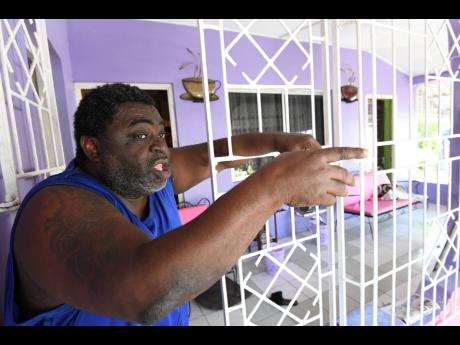Blackout blues cripple Woodford Park
But JPS says 83% of electricity stolen
Residents of Woodford Park in southeast St Andrew are lamenting the daily disruption to their electricity supply, for several hours, since June.
Some householders theorise that legitimate Jamaica Public Service Company (JPS) customers are being punished for the actions of residents who have illegally tapped into the grid and are abstracting electricity.
But JPS Director of Corporate Communications Winsome Callum countered that about 83 per cent of the electricity supplied to the community is stolen.
In an emailed response on Tuesday, Callum blamed interruptions in the power supply to the community on a system overload caused by theft, which leads to equipment failure.
However, that’s no comfort for Hugh McKenzie, who has grown weary of the frequent outages and is appealing to JPS to address the situation.
His daughter has been provided with the resources to work remotely but has had to return to the office because of inconsistent power supply.
“Every day the light lock off from about 10, or sometimes nine, until about 7 o’ clock in the evening. The bills a come same way and even more. JPS see di mathematics seh dem saving money when dem lock we off a day time, because of the ratio of conformant to non-conformant customers, and that is exactly the problem,” McKenzie said.
Valerie Grant’s five grandchildren and great-grandchildren have been travelling to Portmore daily, at an added expense to their parents, in order to attend online classes. She said that she has suffered spoilage of meat and other inconveniences because of the outages.
She told The Gleaner that she also fears for her safety and that of her family, as at nights, the affected areas are pitch black.
Her bill dated August 18 was $20,127.97. For the previous month, she received a bill of $14,760.81.
Rudolph Campbell, an elderly resident, complained that his perishable items have spoiled in the refrigerator. He said he his monthly bill ranges from $10,000 to $11,000.
“People not supposed to live in this condition, and the worst part about it is that we are paying,” he said.
Kimani Campbell and the members of his household, including two children, have also been affected by the blackouts.
“At a time like this when online schooling plays a very pivotal role in the growth and development of children, not having any electricity for the children to engage in classes is a setback for us. I also have an electric stove and if there is no light, I can’t cook,” he explained.
Campbell said when contact is made with JPS, he is often told that maintenance is being conducted in the area or repairs are being done to the grid.
“When they advise us that it is a power cut maintenance, they indicate to us that they cannot log a report or create a case number due to the fact that it’s something they are doing,” he said.
Another resident, Stephen Boyd, told The Gleaner that last week he had to dispose of his mother’s medication which requires refrigeration.
The diabetic sources her medication from Drug Serv, the state-run pharmacy network, and did not get a prescription refill until Tuesday.
Though he does not pay for the medication out of pocket, he explained that wastage could be prevented if electricity is consistent.
In JPS’s defence, Callum shared that the power supplier spends almost US$40 million each year to deal with theft.
Of that amount, US$30 million is allocated to infrastructure projects, geared at making the system more resilient to theft.
Anti-theft intervention includes the installation of devices to protect the electricity grid, covered conductors, automated metering infrastructure, and technology to detect sophisticated methods of power theft.
Callum revealed that of an estimated 1,500 households, 300 have accounts with JPS, but not all are consistently paying customers. Delinquency among legitimate customers is sometimes upwards of 20 per cent, the communications manager said.
St Andrew South East Member of Parliament Julian Robinson said it is “unfair and unjust” for legitimate customers to be without electricity for several hours each day.
Robinson explained that JPS needs to find a more effective way to address electricity theft by targeting those who are stealing and not disenfranchising paying customers.
Callum asserted that electricity theft cannot be curtailed without strong government and opposition support, as demonstrated in many countries affected by high levels of electricity theft.
“JPS has been calling on successive governments to implement even a few of the best practices used by governments worldwide to bring equity to the electricity market and protect needy persons. These include a social safety net that provides house-wiring assistance and partial electricity subsidies for those below the poverty line, as well as stronger legal deterrents to electricity theft, including increased policing of high-risk communities and the swift prosecution of wrongdoers,” Callum said.

